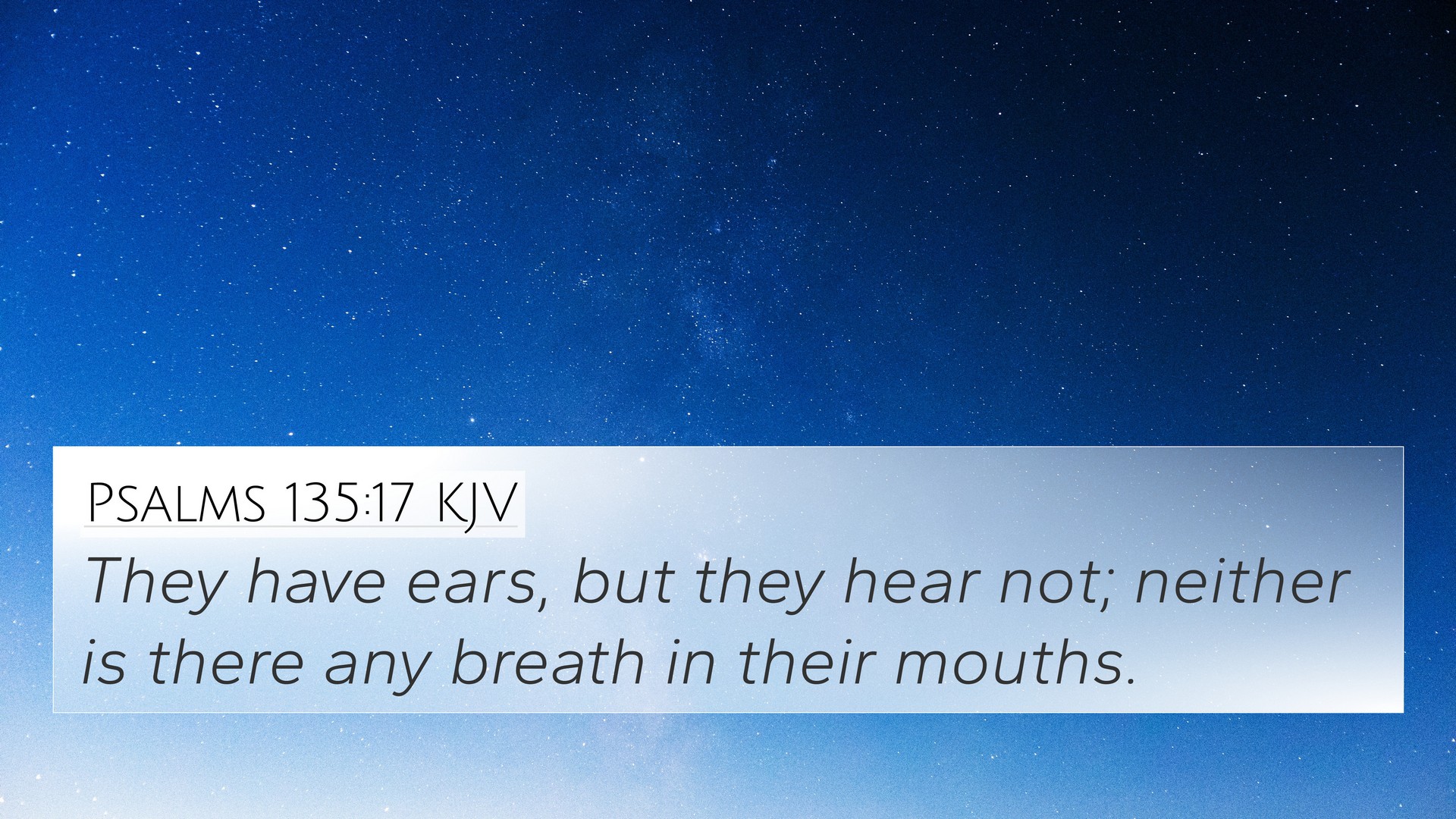Psalms 135:17 - Interpretation and Meaning
Bible Verse: Psalms 135:17 - "They have ears, but they hear not; neither is there any breath in their mouths."
Summary of Meaning
This verse emphasizes the futility of idolatry by highlighting the lifelessness of idols. The psalmist points out that idols, despite having the form of ears and mouths, are devoid of the ability to hear or speak, which implies they cannot respond to their worshippers. This serves as a concentrated critique of false gods and an affirmation of the living God who is able to listen and act on behalf of His people.
Commentary Insights
-
Matthew Henry:
Henry underscores the absurdity of idol worship, noting that these idols lack sensory abilities and do not possess the breath of life. He argues that those who worship such idols become like them: unable to hear the truth of God and incapable of spiritual understanding. The inherent lifelessness of idols serves as a reminder of the dynamic and responsive nature of the true God, who is omniscient and omnipotent.
-
Albert Barnes:
Barnes emphasizes the contrast between the living God and the dead idols of the nations. He elaborates that the ears of the idols represent the inability to hear prayers or petitions, and the mouths signify their impotence to speak comfort or guidance. This verse serves as a stark commentary on the emptiness of worshipping created things instead of the Creator.
-
Adam Clarke:
Clarke interprets the verse as a warning against placing faith in idols that offer false hope. He highlights the importance of recognizing the living nature of God, who actively engages with humanity, in contrast to the mute idols that occupy the hearts of the unfaithful. Clarke points out that this serves as an encouragement for the faithful to trust in the God who not only hears but also answers prayers.
Connections Between Bible Verses
This verse resonates with several other scriptural texts that call attention to the futility of idolatry and the living nature of God. Here are some relevant cross-references:
- Psalm 115:5-7: "They have mouths, but they do not speak; eyes have they, but they do not see..."
- Isaiah 44:9-20: This passage describes the foolishness of crafting idols from wood and the illogical nature of idol worship.
- Jeremiah 10:5: "Like a scarecrow in a cucumber field, their idols cannot speak; they must be carried because they cannot walk..."
- Habakkuk 2:18-19: Points out the utter futility of trusting in idols that cannot provide answers or wisdom.
- Exodus 20:4-5: The command against making carved images or likenesses as gods, reinforcing the exclusivity of worship to the one true God.
- 1 Corinthians 10:20: Paul mentions the demonic nature behind idol worship, establishing a spiritual backdrop to the physical love of idols.
- Romans 1:22-23: Discusses the consequences of exchanging the glory of God for images made to look like mortal man and animals.
- Revelation 9:20: Mentions the prevalence of idolatry, where people refuse to repent from their worship of idols despite witnessing divine judgments.
Thematic Bible Verse Connections
The theme of the living God versus lifeless idols is prominent throughout the Scriptures. This theme serves as a reminder to believers of why they should rely on God's sovereignty. Here are a few more thematic connections:
- John 14:13: Jesus assures that whatever we ask in His name, He will do, presenting a contrast to idols which can do nothing.
- Psalm 146:6: "He is the Maker of heaven and earth, the sea, and everything in them—he remains faithful forever." This verse reiterates the nature of God as the creator, unlike idols which are created.
- Isaiah 45:20-22: God’s invitation to turn to Him, underscoring the wrongness of trusting in false gods.
Utilizing Bible Cross-References
Understanding cross-references is crucial for deepening one's grasp of Scripture. Here are some ways to incorporate Bible cross-references into study:
- Use a Bible concordance to locate verses that share themes or keywords with Psalm 135:17.
- Explore a cross-reference Bible study guide to understand the connections between different verses.
- Engage in Bible chain references for a sequential study of related scriptures.
- Employ tools for Bible cross-referencing to reveal thematic connections that may not be immediately obvious.
Concluding Thoughts
Psalm 135:17 serves as a powerful reminder of the impotence of idols in contrast to the living God who is attentive to our needs and pleas. Through the comparative analysis of related scriptures, believers can better comprehend the significance of placing trust in God alone. By utilizing various tools and methods for Bible cross-referencing, one can uncover a rich tapestry of interconnected teachings and affirmations that further enhance the study of God's Word.


